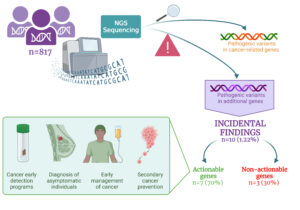Patients with suspicion of hereditary cancer are referred to cancer genetic counselling units, where they are assessed for genetic testing suitability. If so, those genes known to be associated with specific cancer or syndrome predisposition are analysed by a state-of-the-art technology known as next-generation sequencing (NGS). Additionally, NGS enables the analysis of a broad range of genes, allowing for the detection of alterations in genes beyond those associated with certain hereditary cancer syndromes. The identification of these alterations has considerable implications for the patient and relatives. In this sense, the patient could benefit from personalized treatment selection and monitoring programs. (By Dr. Sara Fernández-Castillejo, https://jmg.bmj.com/content/early/2023/08/17/jmg-2023-109389 )
Opportunistic genetic screening increases the diagnostic yield and is medically valuable for care of patients and their relatives with hereditary cancer
(Visited 204 times, 1 visits today)
